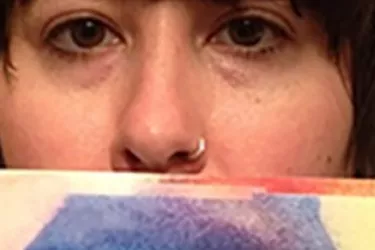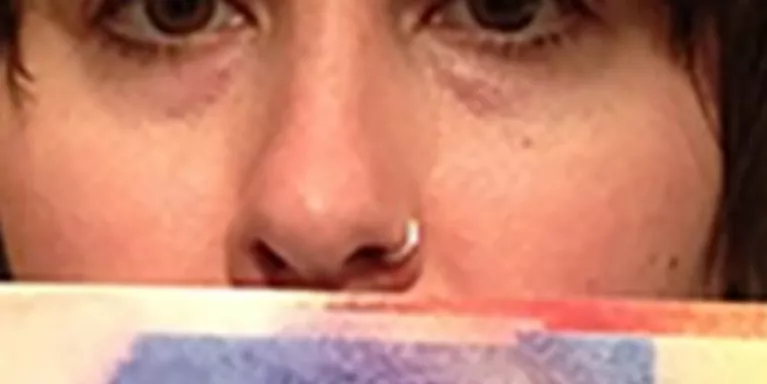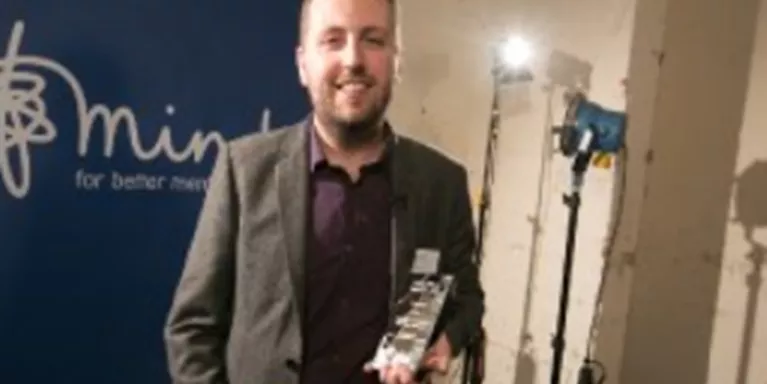Mental health, art and Broken Grey Wires
Lizz blogs about her experience of mental health and receiving treatment in hospital and how it inspired her to kick start an art collective, Broken Grey Wires.
** This blog includes themes on suicidal feelings and self-harm. Please read with care **
In 2014 I was admitted to a psychiatric hospital due to continuing suicidal thoughts and manic behaviour.
I was increasingly self-harming to cope with the voices I heard: a male voice, poking and prodding, whispering that I was a failure and a disappointment.
"Being in a hospital was hard enough, but being so far away from home was even more difficult."
I would also hallucinate visually: walls moving slowly, a subtle tremor in the floor. It would impair my vision and make me feel sick.
My disability benefits had been reduced and so I was struggling financially, obsessively going through my finances trying to live within the tiny budget as well as dealing with the intrusive thoughts of being a ‘benefit fraud’, as ‘society’ so often told me.
Chronic loneliness was also a problem. I was isolating myself from friends and family, telling people I was fine then retreating to my bedroom where I would cry and curse the people who cared for me, for leaving me alone.
I was on huge waiting lists for therapy and having bad side effects from medication. Something just snapped and I didn’t want to be alive anymore.
There were no beds in Manchester, where I lived, so I was carted up to Sunderland where I stayed for a number of weeks.
Being in a hospital was hard enough, but being so far away from home was even more difficult. My parents were able to visit me once, but no friends could afford the trip up and I missed them.
The hospital was quite over run and nurses didn’t seem to have time for you when you were in need.
"I wanted to do something that would inspire people...to tackle the stigma surrounding mental health."
I was meant to see a therapist daily but I was lucky if I saw him once every 3 days. I barely ate, and sleep was difficult but I played a lot of pool, drank gallons of tea and read my only book over and over again.
As new medication kicked in, and I felt more settled and calmer, I started to accumulate ideas for where I could take my art.
I wanted to do something that would inspire people, that would engage communities and promote wonderful artwork.
In the months that followed my discharge from hospital, Broken Grey Wires was formed. An organisation responding to, and exploring mental health through creativity.
"I have good friends around me and that helps a lot."
A lot of blood, sweat and tears have gone into making it approachable, open, honest and personable.
This project has given me a reason to keep moving forward, to push myself and to push others around me, to be the best we can be regardless of our mental health issues.
That isn’t to say it hasn’t been tough (!) some days I just cannot get out of bed in the morning, I cry myself to sleep and I have recurring thoughts of suicide, but I have good friends around me and that helps a lot.
The experience gained from curating exhibitions, booking live bands, sharing ideas and working with other artists has been invaluable. I am learning new things every day which is incredibly satisfying.
I want Broken Grey Wires to inspire. The artists I work with are weird and wonderful, intelligent and ambitious, eccentric and unapologetic. They have inspired me and it is a privilege to work alongside them all - working together to create and develop aspiring new ideas and philosophies, and to tackle the stigma surrounding mental health.
Broken Grey Wires’ first major exhibition ‘People never notice anything’ will take place at Guest Projects, Bethnal Green, London from 13th January to 26th January. The exhibition includes work from artists such as David Shrigley, Jake and Dinos Chapman, Jeremy Deller and Mind ambassador Stuart Semple.

See what we're campaigning on

Information and support
When you’re living with a mental health problem, or supporting someone who is, having access to the right information - about a condition, treatment options, or practical issues - is vital. Visit our information pages to find out more.
Share your story with others
Blogs and stories can show that people with mental health problems are cared about, understood and listened to. We can use it to challenge the status quo and change attitudes.

















